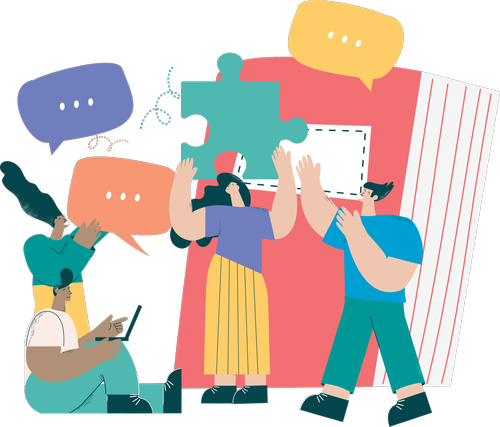
Frequently Asked Questions.
Got questions? We’ve got answers.
And if we don’t, we’ll find them together.
What is Peer Support?
Peer Support is connection through shared lived experience. At The Peer Practice, it means talking with someone who truly gets it — because they’ve been through something similar. Whether it’s mental health, disability, trauma, or identity, our Lived Experience Professionals offer real, human support grounded in empathy, respect, and understanding.
It’s not about fixing you — it’s about walking alongside you. Together, we explore what works for you, at your pace, in a space that feels safe and encouraging.
What does Peer Support look like?
At The Peer Practice, Peer Support looks like real conversations wherever feels safe for you. It’s connecting with someone who’s been through similar experiences and can offer empathy, encouragement, and practical support. Together, we explore your goals, challenges, and strengths—at your pace, in your way.
What sorts of things might we do in a Peer Support session?
It depends on the kind of support you’re looking for! You might talk through what’s been going on, explore your wellbeing, set goals, or tackle everyday challenges. Sessions can happen in your home, at your local coffee shop, in the community, at the gym, or even online or over the phone. Our Peer Mentors and Peer Support Workers offer encouragement, practical strategies, and lived experience insight—like a coach, but with a deeper personal connection.
How is Peer Support different from traditional mental health services?
Peer Support is grounded in shared lived experience. Unlike traditional models, our Peer Workers are formally trained and bring their own personal journeys into every interaction. This makes the support not just professional—but personal, relatable, and deeply meaningful.
We value traditional mental health services and recognise their role in many of our own wellbeing journeys. At The Peer Practice, we simply work from a different model—one that centres connection, mutual understanding, and walking alongside you.
Who can benefit from Peer Support?
Anyone going through life’s ups and downs can benefit from Peer Support. Peer Support offers connection, understanding, and practical help from someone who’s been there too. It’s for people who want to feel heard, build confidence, and explore what wellbeing looks like for them, in a space that’s safe, respectful, and empowering.
How do I know if Peer Support is right for me?
If you’ve ever felt stuck, overwhelmed, or unsure where to start—Peer Support might be a good fit. It’s for anyone seeking connection, understanding, and support from someone who’s walked a similar path. Whether you’re looking to build confidence, find more meaning, or just need help with everyday tasks, our Peer Mentors and Peer Support Workers are here to walk alongside you. Book a free intro call to see how it feels—no pressure, just a chance to explore what support could look like for you.
Is Peer Support confidential?
Yes. We keep things private and safe. We only share info if there’s a serious safety concern — and we’ll always talk to you about it first.
Is peer support just for NDIS participants?
Nope! While some folks use NDIS funding, we also offer private options. Peer support is for anyone who feels it could help.
Do I need a referral to access Peer Support?
Not at all. You can self-refer, book online, or reach out to us directly!
What training and qualifications do Peer Workers have?
Our Peer Workers combine lived experience with formal training in trauma-aware practice, boundaries, and safe support. Many also hold qualifications in areas like mindfulness and meditation, Cert IV in Mental Health Peer Work, Psychology, Social Work—and some are even completing their PhDs!
We’re committed to ongoing learning. Our team takes part in regular internal training sessions to keep skills and knowledge up to date, and we engage in reflective supervision to support safe, ethical, and meaningful practice. It’s support that’s informed, intentional, and deeply human.
How do I become a Peer Support Worker?
If you’ve got lived experience and feel called to support others, we’d love to hear from you. At The Peer Practice, we offer training, mentoring, and a values-led onboarding process to help you grow into the role. Our Peer Workers receive regular internal training to keep skills and knowledge fresh, and take part in reflective supervision to support safe, ethical practice.
Some of our team also hold varying qualifications, so we always encourage seeking further learning!
If you're curious about becoming a Peer Worker, you can book a free intro session to learn more about our study recommendations, or check out our Work For Us section to see current opportunities.
Are there rules or boundaries in Peer Support?
Yes—and they’re there to keep everyone safe, respected, and supported. Our Peer Workers follow clear guidelines around confidentiality, emotional safety, and respectful communication. We’re trained in trauma-aware practice and professional boundaries, and we also take part in regular supervision and internal training to keep our practice strong and ethical.

